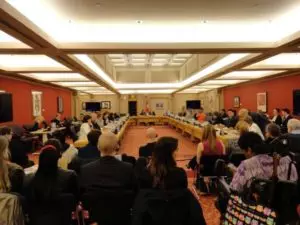Tuesday, April 19th marked a particularly special meeting of the All-Party Anti-Poverty Caucus (APC) that saw the highest turnout of participants and observers in its nearly 4-year history.
The reason for the attention was Hon. Minister Jean-Yves Duclos (Minister of Families, Children and Social Development), who spoke to the APC about his ministerial mandate, the new federal budget, and his ideas for the future of poverty reduction in Canada.
Minister Duclos detailed his plans for actions regarding the promised Canadian Poverty Reduction Strategy and national affordable housing plan. These plans were primarily based off of the recent federal budget, including the new Canada Child Benefit and the increased investment in affordable housing units through agreements with the CMHC. He emphasized that his long-term goal was to form an inclusive, transparent process that respects the authority of provincial, territorial, and municipal governments around the country and is simplified for both the government and citizens. Minister Duclos called for a collaborative effort between different levels of governments and particularly between government and stakeholders in civil society.
Collaboration is not simply a theme of the Minister’s remarks, but an idea that is at the heart of the APC. The Caucus was created from a vision shared by Parliamentarians, civil society stakeholders, and individuals with lived experiences of poverty who all wanted to see real attention being paid to ending poverty in Canada.
The basic premise behind the APC is that people in positions of political power needed more knowledge about poverty to make better-informed decisions and policies, similar to how high-level courts consult with subject matter experts. It is a group of Parliamentarians – from the Senate and House of Commons, as well as from various political parties – who meet in an informal manner to discuss issues around poverty. Members of civil society are invited to provide insight and ask questions in an open discussion.
As you might know, CWP was involved in the formation of the APC and attended its launch on Parliament Hill in June 2012. That day, Harriett McLachlan, President of CWP’s Board of Directors, spoke to the freshly-assembled APC as a first voice of poverty.
What you might not know, however, is the depth of CWP’s involvement with the APC. It all began in 2011, when CWP’s Annual General Meeting welcomed a guest presenter from Parliament Hill to educate our Board on how the Parliamentary process works. Throughout the presentation, it became clear that an informal approach to politics was a viable way forward for the anti-poverty movement to really gain federal political momentum. Afterwards, our Board members met with their own MPs to ascertain their feelings on the idea of an informal anti-poverty caucus. The response was overwhelmingly positive, particularly the point that the APC functions as a completely non-partisan group – one that encourages open dialogue with all parties.
The Hon. Senator Art Eggleton has been at the helm of the Caucus since before its inception and has brought in Parliamentarians from both the House of Commons and Senate and from all three major federal political parties. Currently, the APC is chaired by a steering committee: The Hon. Senator Eggleton; Irene Mathyssen, MP; The Hon. Senator Judith Seidman; The Hon. Judy Sgro, MP; The Hon. Lisa Raitt, MP; and Marjolaine Boutin-Sweet, MP.
In the APC’s relatively short history, it has managed to host many events and inspire conversations about the importance of anti-poverty work. It has held numerous committee meetings, panel discussions, and the launch of Dignity for All’s Model National Anti-Poverty Plan.
This recent APC meeting has come at an important time as we prepare to bring the voices of people in poverty to the development of a new Canadian Poverty Reduction Strategy. So often the voices of people in poverty are silenced. When facing incredible obstacles – including the convoluted perception that poverty is a personal rather than a systemic failure – it is important to have these methods of open communication with Parliamentarians.
By opening up dialogue between people in poverty and those on Parliament Hill, there is an opportunity for new policies on poverty to not just be transparent and effective – but also to embrace our human rights obligations and become a country that truly respects the most marginalized.
Kathleen Burns is the Assistant Coordinator, Development and Outreach with Canada Without Poverty.
Canada Without Poverty is a non-partisan, not-for-profit, charitable organization dedicated to the elimination of poverty in Canada. CWP is here because of your support. We would not be able to continue our work in eliminating poverty without your help. Please consider making a donation to CWP to support our work in ending poverty for everyone in Canada.



